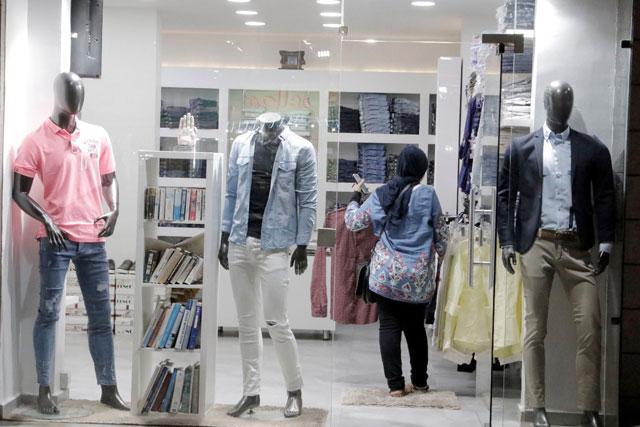You are here
Experts question effectiveness of online shopping limits
By Bahaa Al Deen Al Nawas - Aug 20,2019 - Last updated at Aug 20,2019

To protect local shops, Jordanians can purchase clothes, shoes, foodstuffs and children's toys up to JD500 each year online, according to new regulations (Photo by Amjad Ghsoun)
AMMAN — In light of the new Cabinet decision to impose customs fees on e-commerce products ordered for personal use, some experts voiced concern saying the decision might not help sectors involved.
Prior to the decision, Jordanians were able to purchase clothes, shoes, foodstuffs and children's toys of up to JD200 per month without having to pay customs fees, with the cap being JD2,400 each year; however after the decision, the cap will be JD500 each year, the Jordan News Agency, Petra, reported on Monday.
For authorisation of the products purchased online, customers have to visit www.customs.gov.jo to fill in the necessary data. Then they have to use their name to authorise the entry of the purchased products from any of the four categories, paying JD5 for each order up to JD50 and JD10 for each order between JD50 and JD100, without exceeding the annual cap.
However, if a purchase is made without filling in the data on the website beforehand, customers have to pay JD15 for each order up to JD50 and JD25 for each order between JD50 and JD100.
The Jordan Customs Department took the new steps in order to organise e-commerce in a way that protects local products and internal trade from online shopping, Petra said.
However, economist Mazen Marji told The Jordan Times on Tuesday that these decisions "show how the government is out of ideas, because the economy's issues are internal, because of recession in purchase power as well as in the services provided by public and private sectors alike".
The finance minister attributed the government's financial losses to cigarette smuggling and e-commerce, Marji said, but according to the expert, losses suffered from this trade are insignificant.
The economist noted that the trade sector is already weak, and "this is why the government does not announce figures that show exactly how much losses e-commerce causes."
"The world is progressing from traditional commerce to e-commerce,” Marji stated, adding “even the US, a country with one of the strongest economies, did not resort to imposing taxes and fees to combat the same issue, but rather supported and offered incentives to their own companies by reducing taxes and fees in order to help them improve and compete fairly with e-commerce."
He added that the path the US has taken could have been one of many solutions for Jordan to help clothing shops to improve their situation.
The idea of making people pay more taxes to protect local products and traders and to bring revenue "has proven to be a failure, especially since the government's revenues went down by JD118 million in six months,” he said, adding “it is time to admit this method does not work in the face of e-commerce, which will be a way of the future that we need to adapt and live with."
Asaad Qawasmi, a representative of the clothes, garment and jewellery sector at the Jordan Chamber of Commerce, said that the decision does not meet the traders' expectations, as the competition between traditional and e-commerce is still unfair, as taxes imposed on the traditional commerce amount to 50 per cent, apart from salaries, bills and operational fees.
Those who operate with e-commerce pay much less compared to traditional shops, Qawasmi said, agreeing with Marji's opinion that it would have been better to reduce burdens on traditional shops to make the competition fairer.
For his part, President of the Textile and Readymade Clothes Syndicate Muneer Deyeh said that the government took the decision without consulting with the private sector, chambers of commerce or associations, "changing nothing, but only giving an official form for many violations that take place through e-commerce".
"What we need is true equality for the trade sector involved in this issue, which has over 20,000 companies and institutions, making the tax and customs burdens equal for the trade sector that pays its taxes and fees and employs Jordanians," Deyeh said.
Dalia Zarzour, a 30-year-old mother who works in social media, said that she is used to buying clothes from Turkey for herself and her daughter, and, up to a certain amount, she does not have to pay any customs fees.
She said that even when the decision takes effect, those who cannot afford to pay the extra fees might not be able to afford buying from normal shops as well.
"I personally will still buy clothes online, but maybe not the same amount as before," she added.
Related Articles
AMMAN — Experts on Saturday raised eyebrows over the recent Cabinet regulations on e-commerce, which they say is a far cry from measures imp
AMMAN — A well-known company that facilitates online shopping for Jordanians through Amazon has shut down following a Cabinet decision to im
AMMAN — Representative of the Garment and Jewellery Sector at the Jordan Chamber of Commerce (JCC) Asad Qawasmi on Saturday renewed calls on



















